5 tricks to making a mind-blowing burger
Follow these guidelines to make the best burger you've ever tasted
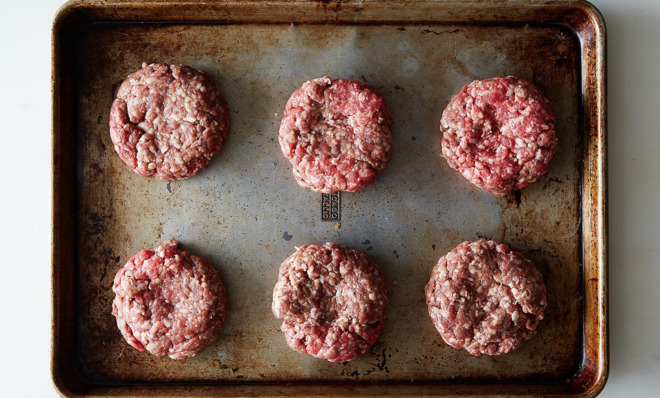
A free daily email with the biggest news stories of the day – and the best features from TheWeek.com
You are now subscribed
Your newsletter sign-up was successful

There is hardly any food, besides maybe apple pie, as quintessentially American as the burger. But, perhaps due to their prominent place in America's food history — and in so many people's personal food histories — hamburgers inspire a lot of strong opinions. In recent years, our collective love of the hamburger has manifested itself in an onslaught of fancified, outrageously expensive hamburgers made with swanky custom blends and piled high with showy toppings. Once a simple, fast, and inexpensive food, hamburgers are now priced around $15 on average in New York City, with some reaching as high as $120, $175, $295, and $666.
Because of all this hype, making burgers at home may suddenly feel overwhelming. I want to make clear one point: Burgers are, and should remain, a simple food. If you follow these guidelines, you can make the best burger you've ever tasted, right in your own kitchen (or backyard). So take a deep breath, and let's get started.
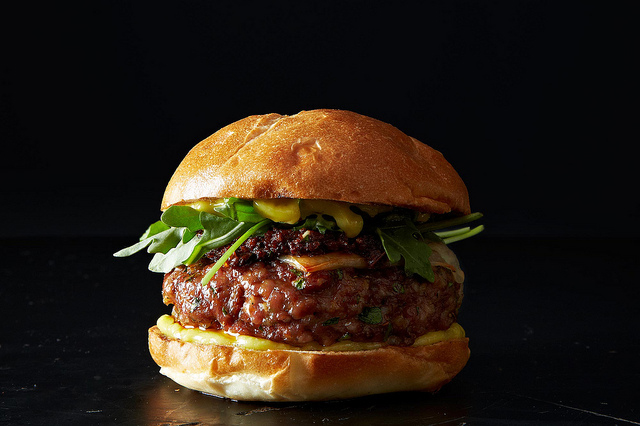
The number one most important rule to better burgers is this: BUY GOOD MEAT. Buy it from a source you trust; one that cares about how their animals are raised and the freshness of the product they are selling you. This goes for buying any meat, but it is especially important with ground meat, since pre-packaged ground meat carries a higher risk of e-coli, and is often filled with shady stabilizers to increase shelf life. Eat Wild is a great resource if you are unsure of where to buy good meat in your area.
The Week
Escape your echo chamber. Get the facts behind the news, plus analysis from multiple perspectives.

Sign up for The Week's Free Newsletters
From our morning news briefing to a weekly Good News Newsletter, get the best of The Week delivered directly to your inbox.
From our morning news briefing to a weekly Good News Newsletter, get the best of The Week delivered directly to your inbox.
Now let's talk about cuts. Regardless of what food magazines and newspaper articles tell you, you do not need a custom blend of fancy cuts to make a good hamburger. In fact, the best burgers are made from the hard-working, cheaper cuts on an animal. Because these muscles are working harder, there is more blood flowing through them, which translates to more flavor. And, since you're grinding the meat up, you don't have to worry about the toughness that often characterizes hard-working cuts. Cheap and flavorful — what more could you want?
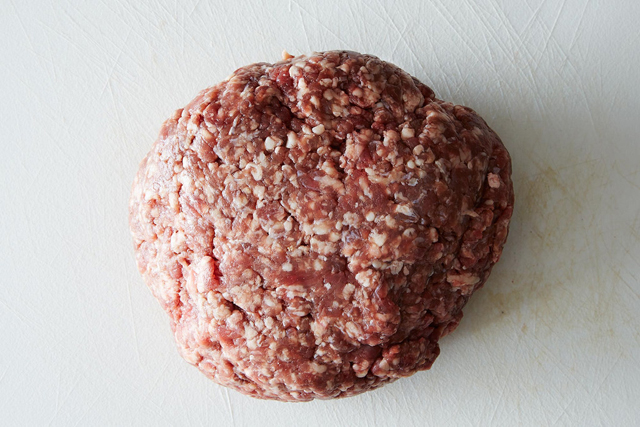
These cheaper cuts, especially ones from the shoulder like chuck and brisket, will also have a higher fat content. This is paramount in making a good burger. For the juiciest and most flavorful burgers, you need a fat content that is, at minimum, 20 percent — the best burgers have closer to 30 percent.
If you are itching to create a custom blend, or don't have access to a butcher you trust, try grinding your meat at home! Grinding your meat yourself gives you more control over fat content and freshness. To reach the fat content you're aiming for, try a combination of fattier cuts like chuck, brisket, or short-ribs with leaner, cheap cuts like bottom round, sirloin, eye round, top round, or shank.
Now that we've covered the basics of quality, cuts, and fat content, let's talk about some other tips to make your burger great.
A free daily email with the biggest news stories of the day – and the best features from TheWeek.com
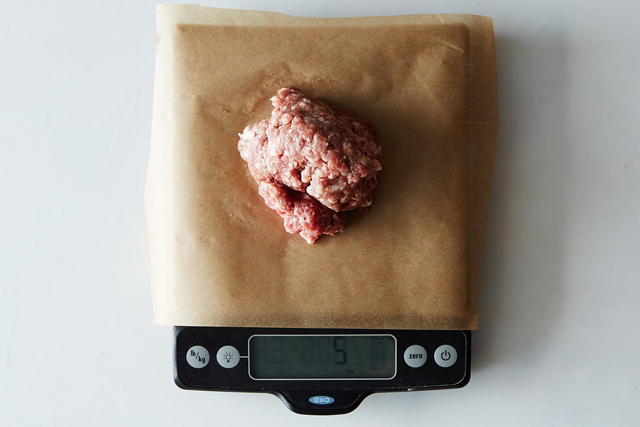
Weight: A super thin burger will be around 1/4 pound, or 4 ounces. A big, chunky burger will be around 1/2 pound, or 8 ounces. A regular, in-between burger is about 1/3 of a pound — between 5 and 6 ounces. It's worth scaling out the burgers so that they cook uniformly.
Pattying: You don't want to overwork your patty, lest your meat become tough and chewy. However, underworking your meat will lead to a crumbly mess. Try to find a healthy in-between. I like to form my meat into a ball and slap it back and forth between my hands about ten times before shaping it into a patty. If you don't have a patty press, use a big jar lid to get your patties into a uniform shape and size. After working your meat, simply press it into the lid, and voila!
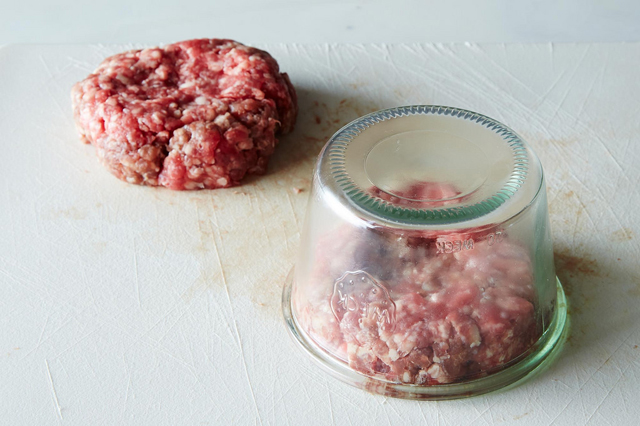
Indent: When any muscle cooks, it contracts. If you're making a burger, this can mean that your meat will shrink up and become impossible to find inside your bun. Making an indent in the center of the patty solves this problem because it helps the burger to hold its shape as the meat contracts. After shaping your patty, simply place your thumb in the center and gently press to create an indent.
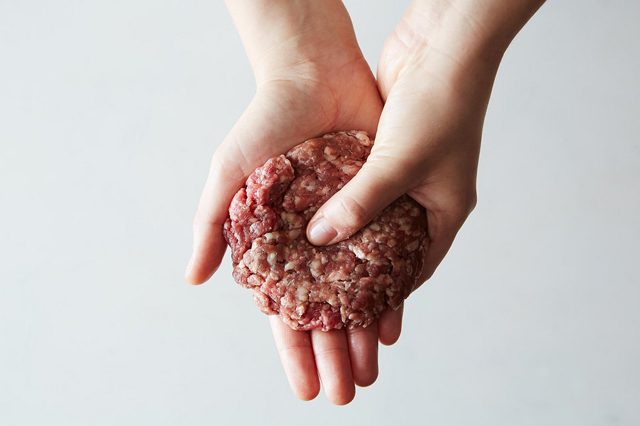
Seasoning: Since you're using fattier, hard-working cuts for your burger, you don't need much to season it. Salt and freshly-cracked black pepper work perfectly — these good quality, cheap, and fatty cuts will have enough flavor on their own. Don't work the salt and pepper into the patty — Instead, simply season it on both sides once it's about to go on the grill. Keeping these seasonings on the outside will help the burger form that coveted caramelized crust.
Grilling: Clean your grill before cooking to avoid sticking. Get it warmed up, then scrape it down with a wire brush to help avoid sticking. Once the grill is clean, grease it using a paper towel or pastry brush dipped in neutral oil. Do not press the burger down with a spatula while cooking! Stop doing that! I know it looks and sounds cool when it hits the coals, but you are pressing all of the delicious juice out, so stop! Your burgers will thank you.
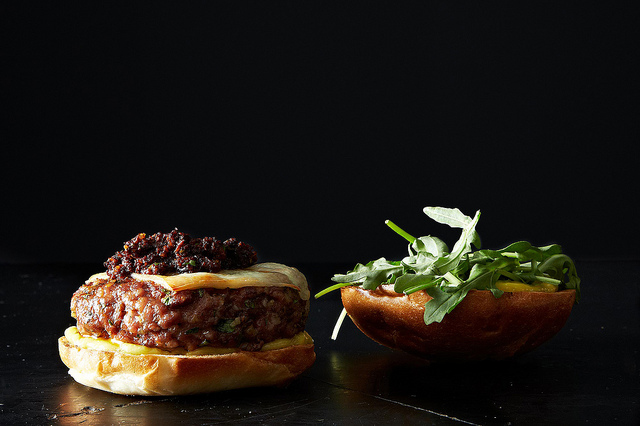
This article originally appeared on Food52.com: 5 tricks to making a mind-blowing burger
More from Food52...
-
 Switzerland could vote to cap its population
Switzerland could vote to cap its populationUnder the Radar Swiss People’s Party proposes referendum on radical anti-immigration measure to limit residents to 10 million
-
 Political cartoons for February 15
Political cartoons for February 15Cartoons Sunday's political cartoons include political ventriloquism, Europe in the middle, and more
-
 The broken water companies failing England and Wales
The broken water companies failing England and WalesExplainer With rising bills, deteriorating river health and a lack of investment, regulators face an uphill battle to stabilise the industry